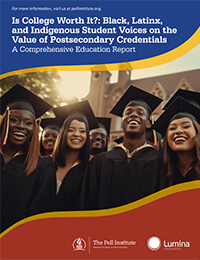Shreesha, a third-year psychology student, always knew she would go to college—her parents instilled that notion at an early age—to make something out of “the family name.” For fourth-year psychology student Anna, education after high school meant she could give back to her community. And students like Olené, a third-year student studying sociology, say getting a decent education is challenging if he can’t afford basic needs.
Amid growing concerns over student debt and skepticism over the value of a degree, these students, like many, find themselves asking: Is college worth the time and money?
Their voices are part of a new report, “Is College Worth It?” from Lumina Foundation and our partners at The Pell Institute. Researchers polled 1,800 Black, Hispanic and Latino, and Native American students in colleges across the nation, including learners in federally funded TRIO programs, asking for honest opinions on the benefits of a college education.
And they didn’t hold back.
Through exploring increasing complexities around higher education and why some students persevere despite enormous challenges, we found that higher education brings value in six ways:
- Economic: Despite the burden of student loans, most students believe their investment in higher education is worth it as a path to economic stability. Yet, balancing multiple jobs and worrying about basic needs add pressure and hurt academic performance and well-being.
“One big challenge is whether I can afford to pay my phone bill or afford to eat… If our basic needs are not being met, that prevents all of us from trying to have a decent education,” Olené told researchers. Adds business administration student Jaidyn, “I want to be able to be that breadwinner in my family. College is an investment because you get to start your life with more options. When I graduate, I will love to provide for my family… and be financially stable.”
- Professional: Students credit their college education with providing the skills needed for professional success, even in an uncertain job market. They see their degree enhanced by mentoring and support from faculty, advisors, and peers. This underscores the importance of strong career preparation, guidance, and matching academic programs to job market needs.
- Social Network: College is crucial in building social networks that drive academic and career success. Campus groups, TRIO programs, and interactions with faculty offer vital resources and support. Some students may face isolation due to discrimination or bias, but the connections formed are seen as invaluable.
“Some of my friends have really shown me what type of people will value me,” said Percy. “It allows me to be myself unapologetically…I value their opinions about what’s the best way in our field and what decisions we have to make to be successful in our careers in the arts. It’s very rewarding, honestly.”
- Personal: Students experience significant personal development during college. For many, it’s a journey that fosters self-discovery, resilience and a lifelong commitment to learning. Many say earning a degree means personal freedom, stability and realizing long-held dreams.
- Familial: Students often view pursuing a degree to honor family expectations and cultural values. For many students, especially those from immigrant backgrounds, academic success is a source of pride for their families, younger siblings, and communities.
“I’ve always had my parents talk about going to college since I could remember. They would tell me, ‘You just have to go get a degree, so you can make something out of yourself, something out of our family name…’ Now there’s no pressure. They just want me to keep getting my degree, however many I can get, and keep pursuing what I like to do,” Shreesha said.
- Collective: Many students see their education as a way to contribute to societal progress, getting more involved in civic and social justice causes. They want to use their degrees to improve communities, advance equity, and address systemic issues.
“I want to invest in my community… helping with the stigma of mental health, because there’s a lot of people near and dear that struggle with it but don’t feel comfortable reaching out,” Anna said. “It’s so hard to find a Hispanic doctor or provider or even a therapist. If I can be that representation for someone else, so they feel comfortable… receiving the help they need.”
This report offers ways for educators and policymakers to enhance programs and practices to help students thrive. By listening closely to students, we can work to ensure that higher education remains a path to equity, empowerment, and opportunity for all.
[Wendy Sedlak, Ph.D., is the strategy director for research and evaluation at Lumina Foundation, an independent foundation committed to helping all Americans learn beyond high school. In her role, she uses evidence and data to guide Lumina’s strategic direction, documents effective practices, and measures progress.]

